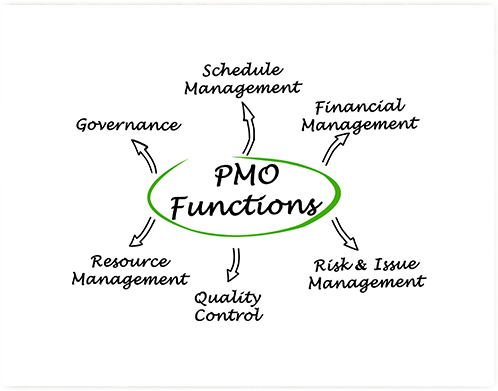Project Management Office: Old Concept – New Interest

For years, the Project Management Office (PMO) has been a concept many project-based organizations are familiar with. However, most small to mid-sized firms do not have the personnel available to staff this mid-level management position. With the recent challenges we are facing with the recession, we have seen a renewed interest by firms who want to enhance their oversight and management of project performance, business development pipeline and hit rates, accounts receivable collections, WIP management, and utilization metrics. Having a handle on all things project performance is key to a firm’s success.
What exactly is a PMO?
The concept of an “office” or “team” dedicated to project performance oversight can be daunting. In fact, the PMO can be just one person, an outsourced resource, or a team of Project Coordinators/Accountants who can help your firm move the needle on project and profit performance. Google “PMO,“ and you will find a myriad of definitions.
 What does the PMO do?
What does the PMO do?
Governance over all things project-related in your firm. The PMO:
- Assesses and refines delivery tools, including project setup, review tools, and establishes guidelines to ensure consistency across the entire project portfolio.
- Empowers your Project Management team by ensuring they have the tools and training to apply Project Management Best Practices for internal and external coordination and delivery.
- Manages best practices, which may include publishing a PM Standards Manual or Guidebook to hold the Project Management team accountable. Accountability for standards compliance is exceptionally challenging without written guidelines.
Schedule & Resource Management
- Assists with the Project Management Team. The PMO coordinates with the Project Management team to ensure that resources are assigned to projects, estimated start and completion dates are updated on projects/phases (absolutely required for forecasting), and that scheduling tools are up to date. All these items are essential to ensure that the Project Management team has insight into staff availability and utilization.
Financial Management Oversight
- The PMO should maintain continual oversight of projects to ensure that Project Managers are aware of existing and potential financial performance issues on projects. The PMO works with the Leadership and Project Management teams to define the Key Performance Indicators (KPIs) most relevant to the firm and ensures that those KPIs are reported and reviewed regularly.
KPIs commonly used to assess project performance are Labor Multiplier, Reported Percent Complete, Estimate at Completion, Estimate to Complete, Earned Value Analysis, and Profit Performance. The PMO ensures accountability and progress toward achieving Firm targets.
Risk & Issue Management
- This is an area where the PMO can be a game-changer. In too many firms, Project Managers are wearing multiple hats or lacking the tools and reporting that would provide the forward look needed to assess projects for potential risks and issues. Part of the PMO’s responsibility is to evaluate financial metrics, deliver schedules, and budget performance to assess projects for potential risks. The PMO is also responsible for ensuring that Change Management processes are published and that teams are held accountable.
Quality Control
In my experience, quality control is sometimes overlooked due to scheduling challenges. Does this resonate? A project deadline is Friday and all hands are on deck to get the project out the door, but the QAQC review gets missed in the frenzy. A PMO tracks the project delivery deadlines and the associated required tasks to ensure that the team does not miss this vital process. The risk your firm assumes by omitting the QC phase is not worth meeting the deadline.
Do You Need a PMO?
If you can answer “yes” to the questions below, it’s highly likely your firm could benefit from a PMO. Ask yourself these questions.
- Everyone is ‘too busy’ to review project performance
- Project Performance information is hard or impossible to get your hands on
- You wish you had backlog and resource forecasting, but your data isn’t providing what you need
- Projects are delivered late and/or over budget
- Your team has not been formally trained to develop Project Management skills
- Project Managers aren’t held accountable for project performance
- WIP and AR balances aren’t ‘healthy’
So, how did you respond? Remember, this doesn’t need to be overcomplicated, nor do you need an entire ‘office’ of people to establish a PMO. For more insight into the Project Management Office, please join our upcoming webinar on the Importance of Project Management: Not JUST in Uncertain Times. We’ll share insights from our experiences working with firms to optimize their project management processes and reporting and coaching on Principal engagement for project management oversight.



